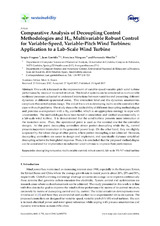Comparative Analysis of Decoupling Control Methodologies and H¥ Multivariable Robust Control for Variable-Speed, Variable-PitchWind Turbines: Application to a Lab-Scale Wind Turbine
Autor
Fragoso, Sergio
Garrido, J.
Vázquez Serrano, Francisco J.
Morilla, Fernando
Editor
MDPIFecha
2017Materia
Decoupling networksMultivariable control
Robust control
Lab-scale VS-VP wind turbine
METS:
Mostrar el registro METSPREMIS:
Mostrar el registro PREMISMetadatos
Mostrar el registro completo del ítemResumen
This work is focused on the improvement of variable-speed variable-pitch wind turbine
performance by means of its control structure. This kind of systems can be considered as multivariable
nonlinear processes subjected to undesired interactions between variables and presenting different
dynamics at different operational zones. This interaction level and the dynamics uncertainties
complicate the control system design. The aim of this work is developing multivariable controllers that
cope with such problems. The study shows the applicability of different decoupling methodologies
and provides a comparison with a H¥ controller, which is an appropriate strategy to cope with
uncertainties. The methodologies have been tested in simulation and verified experimentally in
a lab-scale wind turbine. It is demonstrated that the wind turbine presents more interaction at
the transition zone. Then, this operational point is used as the nominal one for the controller
designs. At this point, decoupling controllers obtain perfect decoupling while the H¥ control
presents important interaction in the generated power loop. On the other hand, they are slightly
surpassed by the robust design at other points, where perfect decoupling is not achieved. However,
decoupling controllers are easier to design and implement, and specifically dynamic simplified
decoupling achieve the best global response. Then, it is concluded that the proposed methodologies
can be considered for implantation in industrial wind turbines to improve their performance.

